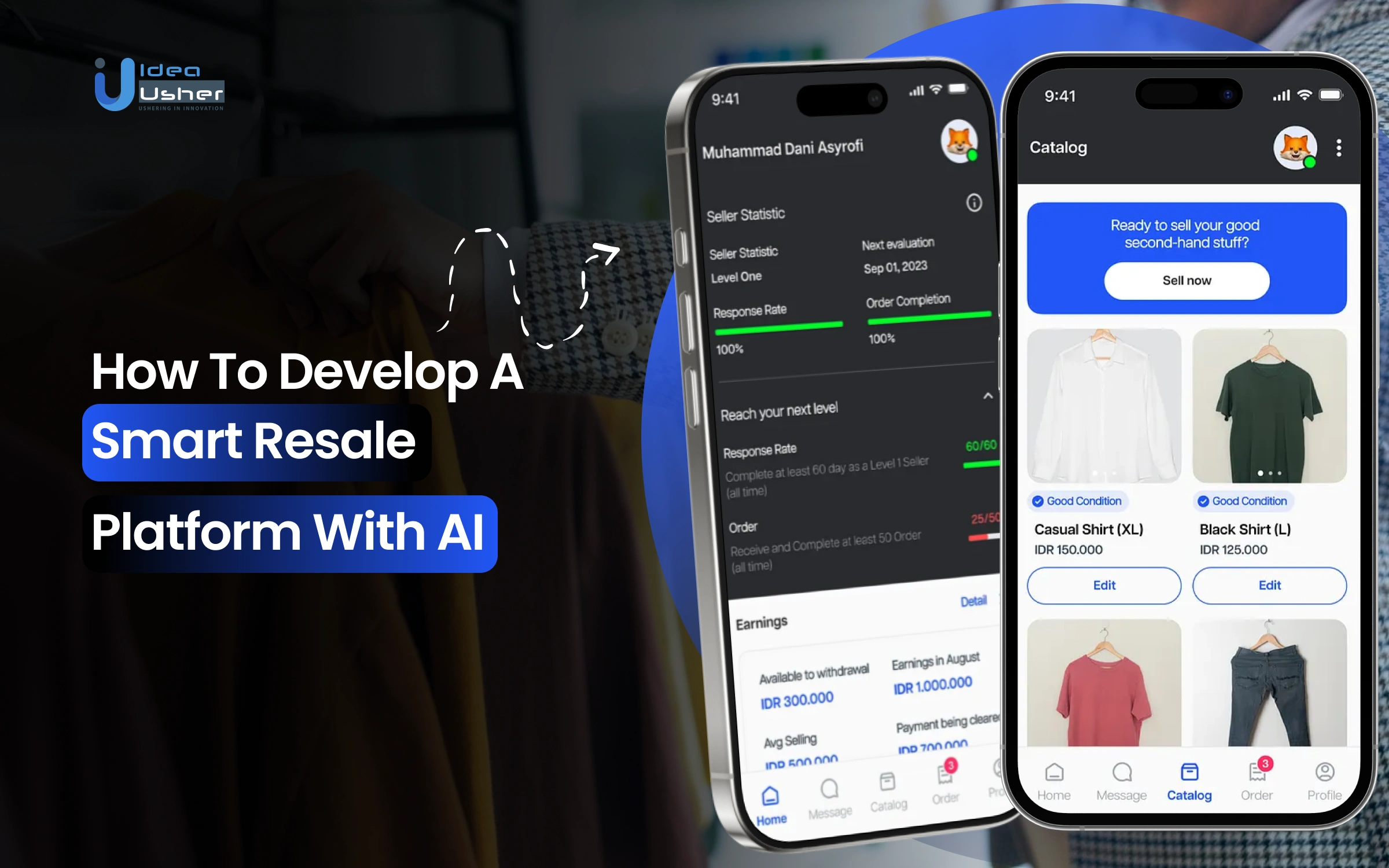The resale market has grown rapidly in recent years, driven by rising interest in sustainability, second-hand shopping, and affordable access to quality products. Yet, buyers and sellers often face challenges like pricing uncertainties, trust issues, and inefficient matching of demand and supply.
These gaps create friction in what could be a seamless experience. An AI-powered Smart Resale Platform tackles these challenges by offering real-time pricing insights, automated buyer-seller matching, and trust-enhancing features like verified listings and secure transactions. By combining data-driven intelligence with intuitive design, it makes buying and selling second-hand goods faster, safer, and more convenient.
In this blog, we’ll explore how to develop a smart resale platform with AI, the essential features to include, and the steps businesses can take to build solutions that tap into this fast-growing market while delivering trust and convenience. As we have helped various businesses launch AI-driven platforms that captured substantial user bases and generated significant transaction volumes, IdeaUsher has the expertise to build an AI resale platform that maximizes market opportunity.

What is a Smart Resale Platform?
A smart resale platform is an online marketplace that leverages advanced technologies such as artificial intelligence, machine learning, and data analytics to streamline the buying and selling of pre-owned goods. Unlike traditional resale websites, these platforms go beyond simple listings and transactions; they provide intelligent recommendations, fraud prevention systems, personalized experiences, and automated pricing to make the process more efficient and reliable.
To put it simply, a smart resale platform transforms second-hand trading into a seamless, data-driven, and user-friendly experience. Instead of just connecting buyers and sellers, it actively adds value through automation, security, and personalization.
- Automated Pricing Models: AI analyzes demand, product condition, and market trends to suggest optimal resale prices.
- Personalized Recommendations: Buyers see tailored suggestions based on their interests and browsing history.
- Fraud Detection & Security: Smart algorithms detect suspicious activity to protect both sellers and buyers.
- Seamless Transactions: Integrated payment gateways and digital wallets ensure smooth, secure payments.
- Efficient Logistics Integration: Some platforms automate shipping options, pickup scheduling, and delivery tracking.
- Sustainability Insights: Platforms highlight eco-friendly contributions by tracking the carbon footprint saved through reselling.
How a Smart Resale Platform with AI Works?
A smart resale platform powered by AI streamlines buying and selling by intelligently matching products with interested buyers. It leverages data insights and automation to enhance user experience, pricing accuracy, and transaction efficiency.

1. Seller Onboarding & Item Listing
Sellers upload product details, images, and descriptions, and AI computer vision verifies authenticity, grades condition, and flags issues before listing. This automated process improves listing quality and builds buyer trust through transparency.
2. AI-Driven Pricing Recommendation
Once a product is uploaded, AI algorithms analyze sales history, market trends, demand, and item condition to suggest optimal prices. This dynamic pricing maximizes seller value, offers fair, competitive prices for buyers, and speeds up sales, improving marketplace efficiency.
3. Buyer Personalization & Search
Buyers get a personalized feed via AI recommendations analyzing behavior, browsing, and purchases for relevant listings, predictions, and tailored results. This personalization boosts engagement, reduces browsing time, and increases successful transactions.
4. Secure Transactions & Fraud Prevention
When a buyer makes a purchase, AI-powered fraud detection verifies identities, monitors transaction anomalies, and flags suspicious activity in real time. This proactive security protects payments and builds trust, ensuring a safer resale environment.
5. Logistics & Inventory Optimization
Once a sale is confirmed, AI optimizes logistics by predicting efficient delivery routes, scheduling pickups, and managing inventory. This reduces shipping costs, speeds up deliveries, and helps sellers manage stock while buyers receive orders faster.
6. Post-Sale Feedback
After transactions, AI analyzes feedback, seller performance, and transaction patterns to improve recommendations, pricing accuracy, and fraud detection. This continuous learning ensures the platform becomes more efficient and personalized with every interaction.
Why AI is a Game-Changer for Resale Platforms?
The resale industry is evolving but faces challenges like trust, pricing transparency, product authenticity, and buyer-seller engagement. AI turns these into opportunities by providing advanced intelligence, making it a game-changer for resale marketplaces.
1. Enhanced Trust Through Automated Authenticity Checks
Counterfeit goods and misleading listings are a major concern in resale markets. AI-powered image recognition and metadata analysis enable platforms to verify authenticity automatically, reducing manual disputes and increasing buyer confidence, which is vital for scaling resale businesses.
Example: The RealReal, a luxury resale platform, uses AI tools like Vision and Shield for authentication. Vision analyzes images for counterfeits, and Shield prioritizes items for human review, boosting trust with authentic listings.
2. Smart Pricing for Buyers and Sellers
Resale market pricing is subjective and volatile. AI offers data-driven insights analyzing demand, item condition, seasonality, and past resale data, helping sellers set optimal prices and buyers find fair deals, ensuring a transparent market.
Example: Hammoq employs AI-driven dynamic pricing to adapt to demand, competition, seasons, and product condition, helping sellers set optimal prices and ensuring buyers get fair deals, thus creating a balanced marketplace.
3. Personalized Buyer Experiences
AI enables hyper-personalization by analyzing user behavior, search patterns, and purchase history. This allows resale platforms to deliver tailored recommendations, turning casual browsers into engaged buyers and fostering loyalty.
Example: Stitch Fix uses AI to analyze preferences, styles, and purchase history, offering personalized clothing recommendations that boost customer satisfaction and encourage repeat purchases.
4. Operational Efficiency with Automation
From automated product condition grading to fraud detection, AI streamlines processes that once required significant human effort. This reduces operational costs, speeds up transactions, and improves overall platform efficiency.
Example: The RealReal uses AI to automate product descriptions and authentication, reducing processing times by 10% year over year, streamlining operations and boosting efficiency.
5. Sustainability Insights That Add Value
AI allows resale platforms to quantify the environmental benefits of resale. By showing buyers metrics like CO₂ saved or waste reduced, it transforms purchases into conscious choices, appealing to eco-conscious consumers and giving platforms a unique competitive edge.
Example: Coach partnered with Poshmark to offer “instant resale” for Coachtopia products via digital identities using Eon technology. This promotes sustainability by enabling product resale, reducing waste, and supporting circular economies.
6. Fraud Detection & Risk Mitigation
Resale platforms face risks like scams, counterfeit listings, and fraud. AI leverages anomaly detection, behavioral analytics, and pattern recognition to spot suspicious activity in real time, building trust, reducing disputes, and ensuring a safer resale ecosystem.
Example: Riskified’s Adaptive Checkout uses AI to assess order risk, approve safe orders, decline fraud, and request verification for ambiguous cases, reducing fraud and false declines.

Why You Should Invest in a Smart Resale Platform with AI?
The global second-hand market was valued at USD 523.29 billion in 2024 and is projected to reach USD 1,451.34 billion by 2032, growing at a CAGR of 13.6%. This growth is driven by increasing demand for sustainable consumption, cost-effective options, and AI-powered solutions that enhance resale platforms.
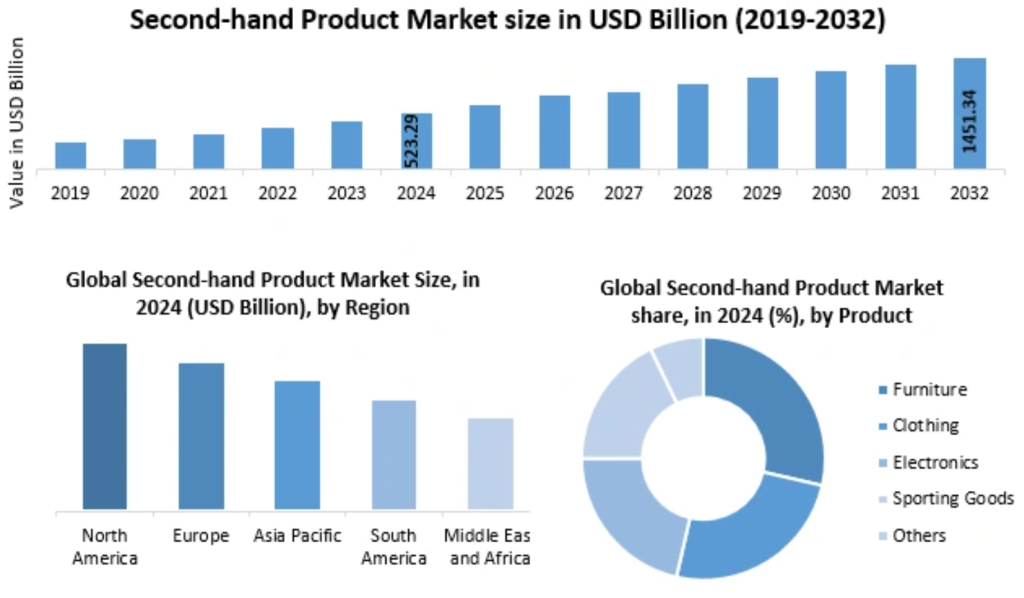
SECONDSENSE, a platform specializing in secondhand luxury goods, raised $2 million to strengthen its AI infrastructure and expand personalization features, empowering shoppers with greater price transparency and convenience.
Renow, a recommerce startup, secured €1.8 million in seed funding to disrupt Europe’s second-hand market with its AI-powered platform, aiming to expand across Northern Europe and improve resale efficiency.
Brandback raised $7.4 million to power AI-driven resale for retailers, enabling embedded recommerce solutions that increase sales and enhance sustainability, signaling strong investor confidence in AI-powered resale.
The resale market is undergoing a transformative shift fueled by AI innovation. Investing in smart resale platforms positions stakeholders at the forefront of this revolution, combining sustainability with cutting-edge technology. As consumers increasingly demand eco-friendly and efficient shopping options, AI-driven resale platforms represent a high-growth investment opportunity with strong scalability and lasting impact.
How AI Transforms the Resale Business Model?
AI fundamentally reshapes resale platforms, making them smarter, faster, and more trustworthy. By integrating AI throughout, platforms become ecosystems that benefit buyers, sellers, and themselves.
1. Automating Product Valuation and Condition Grading
Traditionally, resale value depends on subjective assessments. AI changes this by using computer vision and historical data to grade product condition and detect counterfeits automatically. This automation reduces human bias, accelerates listing times, and builds buyer confidence.
2. Personalized Marketplace Experiences
AI analyzes buyer behavior, search patterns, and transaction history to offer highly tailored recommendations and predictive shopping suggestions. This transforms resale platforms from generic listing sites into personalized shopping ecosystems, increasing engagement and conversion rates.
3. Optimizing Inventory Flow for Sellers
AI predicts demand trends and seasonal shifts, enabling sellers to optimize their listings and timing. This predictive intelligence reduces inventory stagnation, improves turnover rates, and maximizes profitability for sellers.
4. Dynamic Pricing Models
Unlike fixed pricing, AI-driven dynamic pricing adjusts listings in real time based on demand, supply, seasonality, and competitive benchmarks. This ensures sellers receive optimal value while buyers feel they’re getting fair deals.
5. Fraud Detection & Risk Mitigation
AI continuously monitors transactions for anomalies, identity mismatches, and suspicious behavior. This strengthens trust in the platform, minimizes disputes, and protects all parties in the resale ecosystem.
6. Logistics Optimization
AI streamlines delivery and inventory distribution by analyzing routes, predicting demand locations, and optimizing warehouse stock levels. This reduces shipping costs, shortens delivery times, and enhances buyer satisfaction.
Key Features of a Smart Resale Platform with AI
A smart resale platform development powered by AI transforms pre-owned goods buying and selling, making transactions faster, more efficient, and personalized. It uses intelligent algorithms for accurate pricing, seamless matchmaking, and a better user experience.
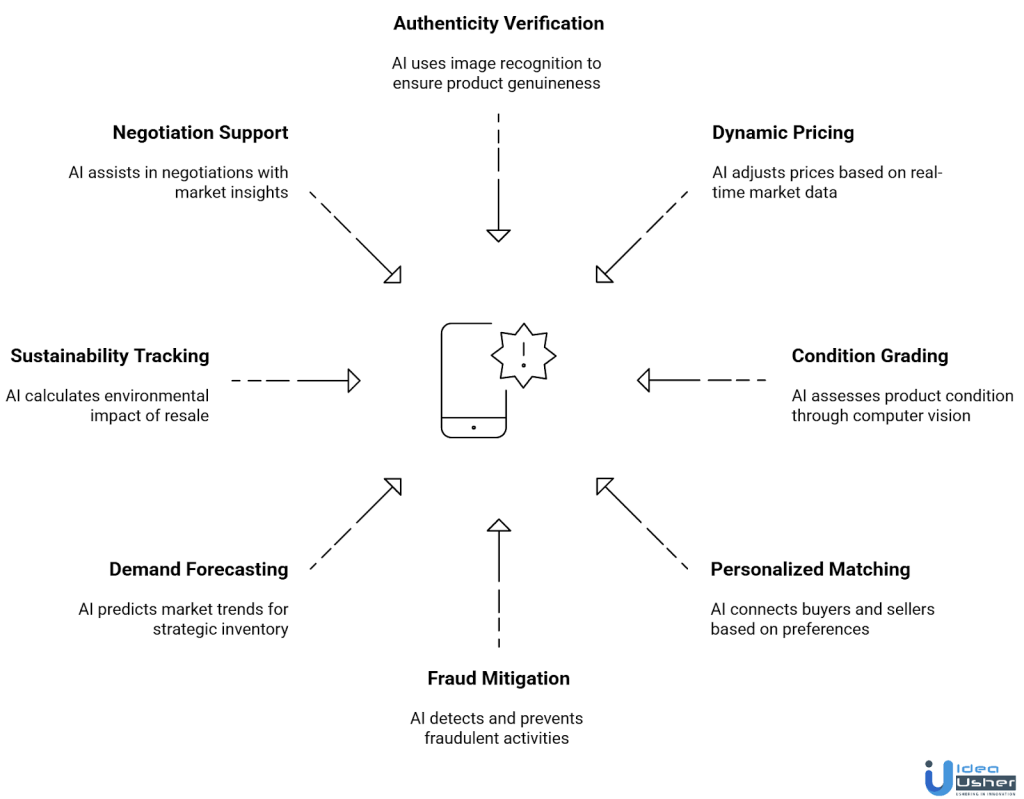
1. AI-Driven Product Authenticity Verification
Counterfeits are a major pain point in resale markets. A smart platform uses AI image recognition and metadata analysis to verify product authenticity. By scanning images and examining stitching, logos, textures, and even purchase receipts, AI flags potential counterfeits before listings go live, maintaining trust and credibility.
2. Dynamic Pricing Intelligence Engine
Instead of sellers blindly setting prices, an AI model monitors real-time demand, product condition, seasonal trends, and historic resale data to recommend the most competitive price. This dynamic pricing engine helps sellers maximize profits while ensuring buyers get fair value, creating a balanced ecosystem.
3. Condition Grading Through Computer Vision
Every pre-owned item has a unique wear-and-tear story. AI-driven computer vision can analyze uploaded photos and grade product condition (e.g., “Like New,” “Gently Used,” “Moderately Used”). This removes subjectivity, improves transparency, and builds buyer confidence.
4. Personalized Buyer-Seller Matching
AI goes beyond simple search filters by predicting intent. For example, if a buyer browses vintage sneakers, the system can match them with sellers specializing in rare drops, instead of just showing all sneaker listings. This creates curated micro-marketplaces, improving conversion rates.
5. Fraud & Risk Mitigation Layer
AI models analyze unusual listing behaviors, repetitive suspicious transactions, and anomalies in payment methods to detect fraudulent activity. Unlike static rule-based systems, the AI fraud engine learns continuously from platform-wide patterns, reducing chargebacks and scams.
6. Demand Forecasting & Inventory Insights
For power sellers or resale businesses, AI predicts which categories (e.g., refurbished smartphones, luxury handbags, or gaming consoles) are about to trend based on external signals like social media buzz, seasonal spikes, and competitor analysis. This helps sellers stock strategically before demand peaks.
7. Sustainable Resale Tracking
AI can calculate and display the environmental impact saved by reselling an item instead of discarding it. For example, showing “Buying this second-hand jacket saved 1,500 liters of water.” This gamifies sustainability and gives eco-conscious buyers a tangible reason to choose resale.
8. Conversational AI for Negotiation Support
Instead of static “chat with seller” features, conversational AI can assist buyers with smart negotiation, suggesting counter-offers based on market data. This keeps transactions smooth and increases the likelihood of closing a deal.

Development Process of an AI-Powered Resale Platform
A smart resale platform development with AI blends technology, design, and data insights to craft a seamless marketplace. It emphasizes developing intelligent features, secure infrastructure, and user-friendly interfaces for efficient buying and selling.
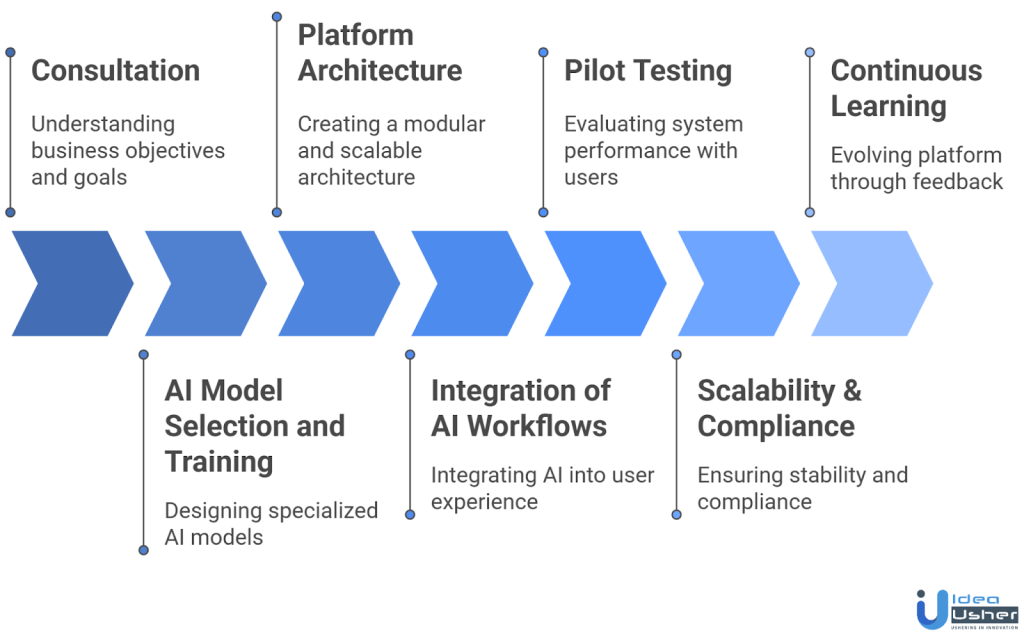
1. Consultation
We start by consulting with you to understand your business objectives, goals, and vision for the resale platform. Our team gathers insights on target users, product categories, and market expectations to align the AI-powered resale platform with your business strategy effectively.
2. AI Model Selection and Training
We will design and train specialized AI models for condition grading, product authenticity, dynamic pricing, and recommendations. Using proprietary seller data and open datasets, our developers will refine these models to balance accuracy, performance, and real-world usability across resale categories.
3. Platform Architecture
Our team will create a modular architecture that supports scalable marketplace operations. This includes frontend for listing and discovery, backend APIs for seamless transactions, and a dedicated AI services layer that powers condition grading, dynamic pricing, and fraud detection for trusted interactions.
4. Integration of AI Workflows
We will integrate AI into every stage of the user experience. Sellers uploading items will see automated grading and pricing suggestions, while buyers will experience personalized product discovery and safe transactions, supported by real-time fraud detection within the smart resale platform with AI.
5. Pilot Testing
Our developers will conduct pilot programs with selected sellers and buyers to evaluate system performance. We will validate the accuracy of authenticity verification, fairness of pricing, and relevance of recommendations, refining both models and policies before moving to large-scale platform deployment.
6. Scalability & Compliance
We will scale the platform with cloud infrastructure that ensures stability and speed, while integrating compliance layers like KYC and AML. Additionally, sustainability tracking will be implemented, enabling users to measure and appreciate the environmental benefits of choosing resale over new purchases.
7. Continuous Learning
Our developers will establish a continuous improvement cycle, ensuring the platform evolves through fresh transaction data, fraud detection insights, and shifting buyer trends. This feedback loop allows the smart resale platform with AI to become more accurate, efficient, and sustainable over time.
Cost to Develop a Smart Resale Platform with AI
The cost of smart resale platform development with AI varies based on features, complexity, and technology stack used. It encompasses expenses for AI integration, app development, design, testing, and ongoing maintenance to ensure a robust and scalable solution.
| Development Phase | Estimated Cost | Description |
| Consultation | $7,000 – $13,000 | Understand business goals, target users, and product categories to align the AI-powered platform with strategic objectives. |
| AI Model Selection and Training | $14,000 – $26,000 | Choose and train AI/ML models for pricing, demand forecasting, and authenticity verification using historical resale data. |
| Platform Architecture | $10,000 – $19,000 | Design a scalable, modular platform integrating front-end, back-end, databases, and AI modules for smooth performance and future upgrades. |
| Integration of AI Workflows | $15,000 – $32,000 | Embed AI into platform features like automated recommendations, pricing strategies, inventory analysis, and fraud detection with real-time processing. |
| Pilot Testing | $7,000 – $13,000 | Test platform with selected users and products to validate AI predictions, usability, and stability before full-scale launch. |
| Scalability & Compliance | $10,000 – $19,000 | Ensure the platform can handle growth, transactions, and integrates compliance with GDPR and resale regulations. |
| Continuous Learning | $10,000 – $19,000 | Enable AI models to learn from user behavior and market trends, improving predictions and platform intelligence over time. |
Total Estimated Cost: $65,000 – $127,000
Note: For businesses aiming to launch a smart resale platform with AI, proper planning and expert execution are crucial. Consult with IdeaUsher to transform your idea into a scalable, AI-driven platform that delivers real results.
Tech Stack Recommendation for AI Resale Platform
A smart resale platform development with AI requires a tech stack that balances scalability, speed, and AI integration. The following layers ensure the platform runs smoothly while delivering trust, transparency, and intelligent automation.
1. Frontend Development
The frontend must deliver a smooth user experience with AI-powered features such as real-time condition grading, dynamic pricing suggestions, and personalized recommendations. Responsive design is key to keep buyers and sellers engaged across devices.
- React.js: A flexible UI library that allows developers to build dynamic, interactive interfaces with reusable components.
- Next.js: Enables server-side rendering for faster page loads and better SEO performance, important for marketplace discoverability.
- Tailwind CSS: A utility-first CSS framework that simplifies styling, making it easier to maintain a modern, consistent look.
- Redux / Zustand: State management tools that keep complex application data in sync, especially important for real-time updates in a resale platform.
- TensorFlow.js / ONNX.js: Allows lightweight AI model execution directly in the browser for instant features like condition grading or search predictions without server delays.
2. Backend & API Layer
The backend powers core marketplace functionality and integrates AI workflows. APIs ensure smooth communication between frontend, databases, and AI services.
- Node.js with Express.js: Handles high volumes of simultaneous requests efficiently and is ideal for scalable backend development.
- Python Flask / FastAPI: Lightweight frameworks for building AI microservices and running prediction APIs efficiently.
- GraphQL / REST APIs: Enables structured data fetching and flexibility in delivering exactly what the frontend requires, improving performance.
- Nginx: Works as a reverse proxy server and load balancer to handle traffic spikes and optimize performance.
3. AI & Machine Learning Frameworks
AI powers authenticity checks, dynamic pricing, condition grading, and fraud detection — making it the backbone of a smart resale platform.
- TensorFlow / PyTorch: Leading frameworks for developing deep learning models with extensive community support and scalability.
- OpenCV: Advanced computer vision library for image analysis, authenticity verification, and condition grading.
- scikit-learn: Offers lightweight and efficient algorithms for predictive analytics like dynamic pricing and demand forecasting.
- Hugging Face Transformers: Supports natural language processing for AI-driven chat, negotiation, and query understanding.
- MLflow: A platform for tracking, versioning, and deploying machine learning models in production environments.
4. Database & Storage
Databases store listings, user information, AI outputs, and large datasets, such as images, requiring speed and reliability.
- PostgreSQL: Powerful relational database supporting complex queries and ensuring data consistency for user profiles, transactions, and product metadata.
- MongoDB: A NoSQL database ideal for storing varied product data, image references, and flexible schemas.
- Amazon S3 / Google Cloud Storage: Secure, scalable object storage for images, receipts, and large AI datasets.
- Redis: In-memory cache that speeds up frequently accessed data retrieval and improves real-time search performance.
5. Security & Compliance Tools
Security is essential for building trust between buyers and sellers while protecting user and payment data.
- Stripe / PayPal: Trusted payment gateways with secure transaction handling and buyer protection features.
- Auth0 / Firebase Authentication: Secure authentication and authorization systems to manage user identities and access.
- OWASP ZAP / Snyk: Vulnerability scanning tools that strengthen the security of applications against potential threats.
- Jumio / Onfido: Identity verification services for KYC/AML compliance to verify buyers and sellers.
- Cloudflare Security: Offers DDoS protection, bot mitigation, and a web application firewall to keep the platform safe.
Challenges and How to Overcome Them?
An AI-powered smart resale platform development faces technical, trust, and scalability challenges. However, these can be addressed with proper strategies to ensure a secure, efficient, and user-friendly platform.
1. Data Quality and Availability
Challenge: AI-driven resale platforms require high-quality, consistent data. Incomplete product images, inaccurate listings, or missing historical sales data can cause errors in condition grading, pricing, and recommendations.
Solution: We implement robust data collection and verification, including AI-assisted image preprocessing, metadata validation, and seller verification. Trusted data sources are partnered with, and datasets are continuously updated to improve accuracy.
2. Counterfeit Detection Accuracy
Challenge: Detecting counterfeit products, especially luxury items, is complex. Incorrect AI predictions can harm buyer trust and seller credibility.
Solution: We combine computer vision with multi-factor authentication, including QR code verification and serial number scanning. AI models are continuously trained with diverse product datasets to improve counterfeit detection accuracy.
3. Dynamic Pricing Fairness
Challenge: AI-driven dynamic pricing can create distrust if perceived as unfair or volatile by buyers and sellers.
Solution: We ensure pricing transparency, showing sellers AI-calculated suggestions and providing buyers insights into price changes. Sellers can make limited manual adjustments while AI recommendations remain accessible.
4. Fraud and Security Risks
Challenge: Resale platforms face risks like fraudulent transactions, identity theft, and payment disputes, requiring real-time AI intervention.
Solution: We implement layered AI security systems, including anomaly detection, behavior analysis, and identity verification. High-risk transactions combine AI detection with manual review, while fraud models are regularly updated.
5. Logistics and Supply Chain Complexity
Challenge: Managing deliveries, returns, and inventory in a resale model at scale is difficult and can impact costs and buyer satisfaction.
Solution: We integrate AI-driven logistics optimization, predicting demand, optimizing delivery routes, and managing inventory dynamically. IoT-enabled real-time tracking and partnerships with reliable logistics providers enhance efficiency.
6. Model Bias and Ethical Concerns
Challenge: AI models can inherit biases from training data, leading to unfair recommendations or pricing that undermine trust.
Solution: We adopt ethical AI practices, auditing models for bias, diversifying training datasets, and creating transparent decision-making. Feedback loops allow users to flag inaccuracies for continuous improvement.

Top Examples of AI-Powered Resale Platforms
AI-powered resale platforms are transforming secondhand buying and selling through technology and sustainability. They utilize AI to streamline listings, verify authenticity, personalize recommendations, and optimize pricing for buyers and sellers.
1. Poshmark

Poshmark’s Smart List AI automates product listings by analyzing photos to generate details like type, size, brand, style, and color, plus a title and description. It saves sellers time, similar to eBay’s AI listings.
2. The RealReal

The RealReal, a luxury resale platform, utilizes AI tools like Shield and Vision to enhance the efficiency of identifying counterfeit items. Shield prioritizes which items need human review, while Vision uses image recognition to flag potentially fake products.
3. Encore
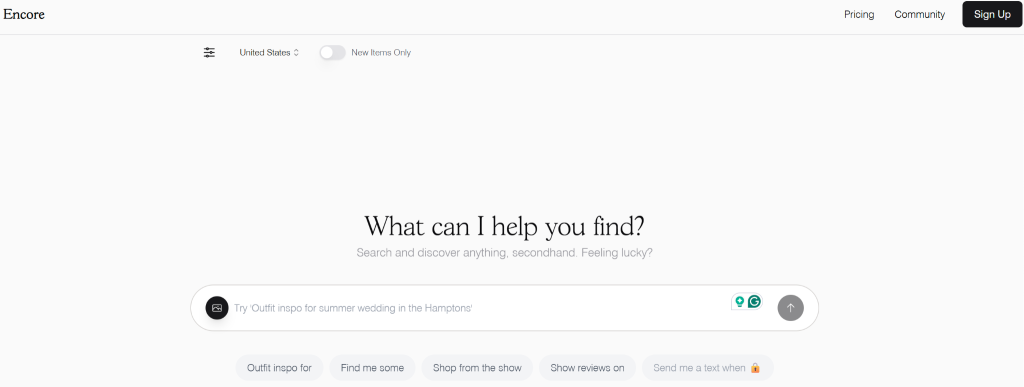
Encore is an AI-powered search engine that consolidates items from hundreds of resale sites, helping shoppers find unique and rare items. Using AI, Encore mimics the thrill of thrifting online, simplifying the discovery of esoteric and unique items across resale platforms.
4. ThredUp

ThredUp, an online secondhand retailer, has launched AI-powered search tools using machine learning and generative AI to understand natural language and images, helping shoppers find style inspiration and create personalized outfits faster with text or images.
5. GOAT
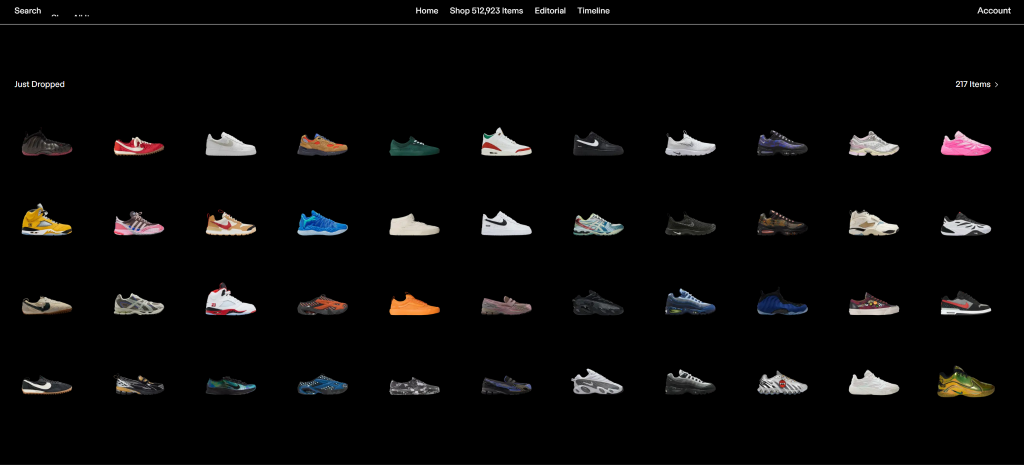
GOAT is an American online platform selling sneakers, streetwear, luxury apparel, and accessories via primary and resale markets. It uses machine learning and computer vision to verify item authenticity, ensuring buyers get genuine products.
Conclusion
Building a smart resale platform with AI opens opportunities to optimize inventory management, enhance user experience, and drive smarter decision-making. By integrating intelligent features, businesses can streamline operations, improve transaction efficiency, and offer personalized experiences. This approach not only boosts platform performance but also strengthens trust and engagement among users. Leveraging AI effectively ensures that such platforms remain adaptive, responsive, and competitive, providing measurable value to stakeholders and creating a foundation for long-term growth in the evolving resale marketplace.
Why Choose IdeaUsher for Smart Resale Platform Development?
IdeaUsher builds AI-powered resale platforms that optimize buying and selling of pre-owned goods. Our team ensures your smart resale platform uses intelligent features like automated pricing, demand prediction, and personalized recommendations to maximize user engagement and operational efficiency.
Why Work with Us?
- AI & Marketplace Expertise: We leverage advanced AI to streamline operations, improve product discovery, and enhance buyer-seller interactions.
- Tailored Solutions: We deliver fully customized resale platforms built for scalability and growth.
- Proven Success: Our platforms have enabled businesses to increase revenue and build loyal communities around their resale marketplaces.
Explore our portfolio to see how we have transformed resale marketplaces with AI innovation.
Reach out today for a consultation, and let us help you launch a smart resale platform that drives performance and growth.
Work with Ex-MAANG developers to build next-gen apps schedule your consultation now
FAQs
A smart resale platform is an AI-powered marketplace that facilitates buying and selling of pre-owned products. It uses intelligent features such as pricing recommendations, inventory management, and predictive analytics to enhance user experience and operational efficiency.
Key features include automated pricing suggestions, AI-driven product recommendations, fraud detection, demand prediction, and chatbots for customer support. These features streamline operations while providing a personalized experience for buyers and sellers.
AI automates tasks like pricing, product categorization, and customer support while analyzing trends to predict demand. This reduces manual workload, enhances decision-making, and ensures the platform operates efficiently at scale.
Businesses gain increased revenue, improved customer retention, and operational efficiency. AI insights help optimize pricing and inventory, while personalized experiences attract loyal users and create a competitive edge in the resale market.


